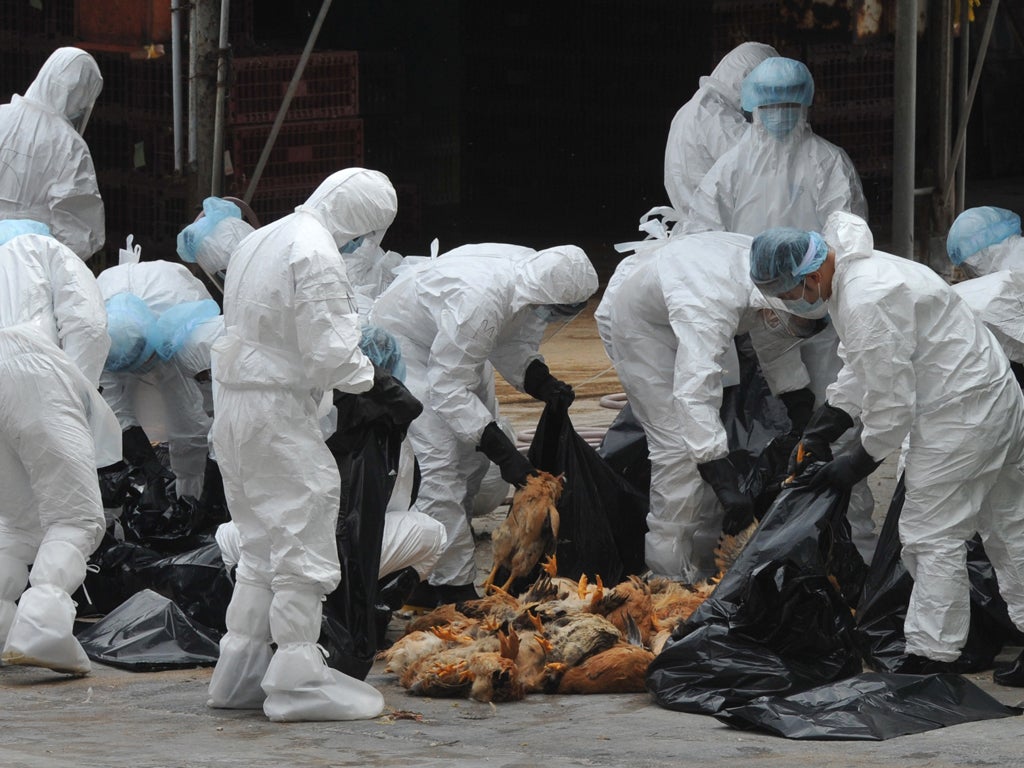Bird-flu victim 'had no direct contact with poultry'
Alarm in China after bus driver dies, and, in nearby Hong Kong, 19,000 chickens have been slaughtered

A Chinese bus driver who tested positive for the H5N1 bird flu virus died yesterday, a week after being admitted to hospital with a fever. He was the country's first reported case of the disease in humans in 18 months, and the circumstances in which he contracted the disease are worryingly uncertain.
During the month prior to becoming ill, Mr Chen, aged 39, apparently had no direct contact with poultry and had not travelled out of his home city of Shenzhen. This is a metropolis of 10 million people, separated only by the Shenzhen River from Hong Kong, where thousands of birds were slaughtered after two were confirmed to have the virus last week.
H5N1 rarely infects humans and usually only those who come into close contact with poultry. Among those infected, up to 60 per cent die, and scientists are perpetually watching the virus for any signs that it is becoming more easily transmissible from human to human. While it transmits less easily between humans, there have been clusters of infections in people in Indonesia and Thailand.
Since 2003, there have been 336 human deaths from 573 confirmed bird flu cases around the world. Of these, 40 cases were in China, 26 of which were fatal. So far, the 120 people identified as having close contact with Mr Chen have not developed any abnormal symptoms.
Mr Chen's death comes a week after two dead birds tested positive for the virus in Hong Kong. More than 19,000 birds at a Hong Kong market were later slaughtered, and imports and sales of live poultry banned for three weeks. Tests confirmed an oriental magpie robin found dead on 17 December was also infected.
China's last reported human case of H5N1 was in June 2010, when a pregnant 22-year-old woman from Hubei Province died after being exposed to sick and dead poultry.
The virus is normally found in birds, but it can jump to people who do not have immunity to it. Researchers worry that it could mutate into a form that would spread around the world and kill millions. In recent years, the virus has become active in various parts of the world, mainly in east Asia, during the cooler months.
The authorities in China are particularly concerned about the spread of infectious diseases as millions will travel in crowded buses and trains across the country to go home for the Lunar New Year on 23 January. The virus also kills migratory birds, but species that manage to survive can carry and disperse the virus to new, uninfected locations.
On Friday, the World Health Organisation warned that dangerous scientific information could fall into the wrong hands after US government-funded researchers engineered a form of the deadly H5N1 bird flu virus more easily transmissible between humans. Earlier last week, the US National Institutes of Health asked scientists at Erasmus University Medical Centre in the Netherlands and the University of Wisconsin-Madison to refrain from publishing full details of their work on how to make the H5N1 virus more easily transmissible between humans. This prompted concern in the scientific community that researchers with a legitimate need to know about these dangerous mutations, particularly in Asia, would be prevented from accessing the data.
Join our commenting forum
Join thought-provoking conversations, follow other Independent readers and see their replies
Comments